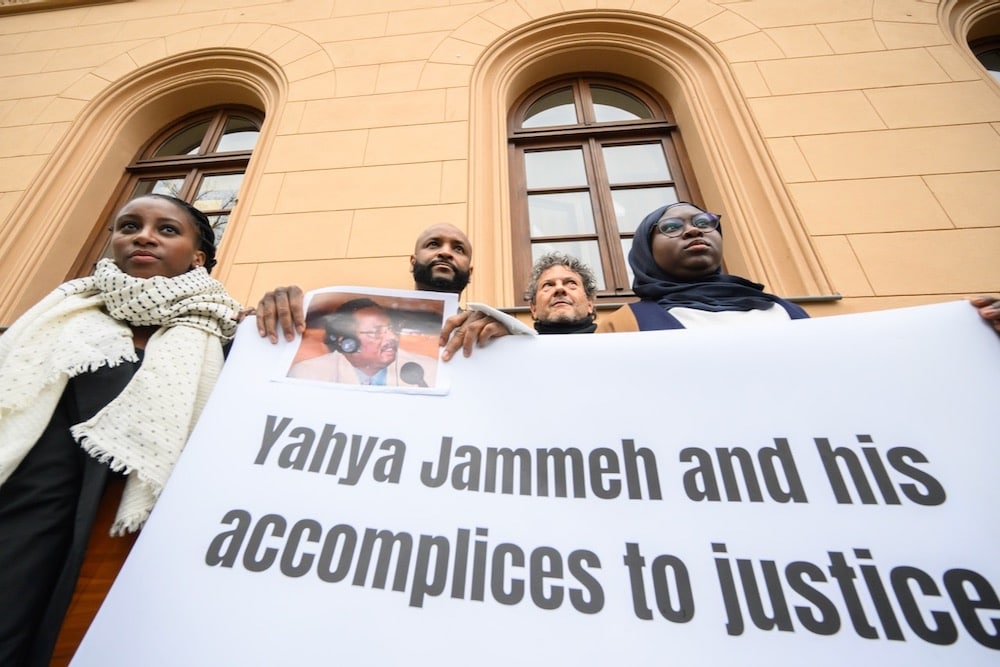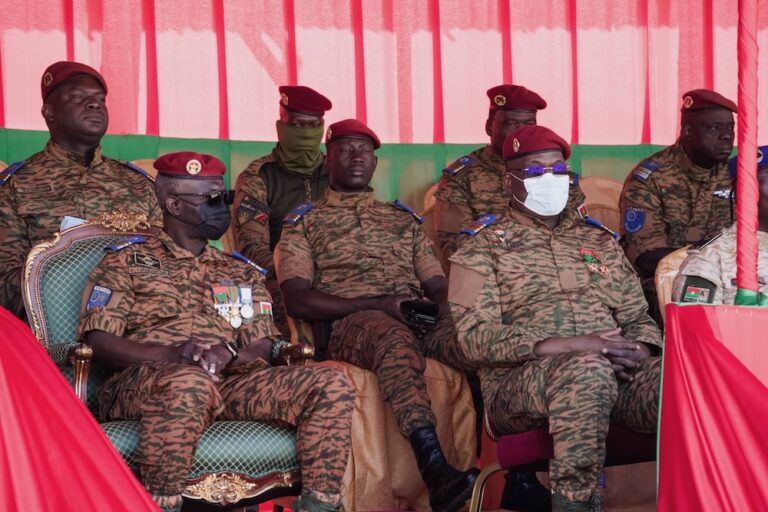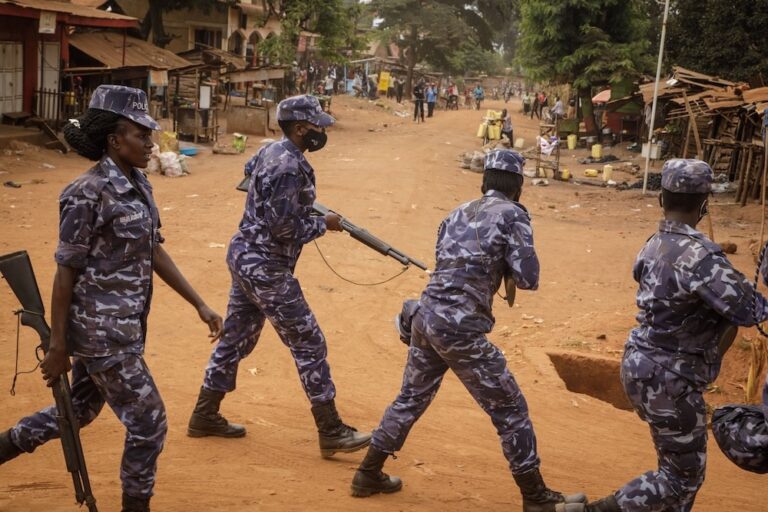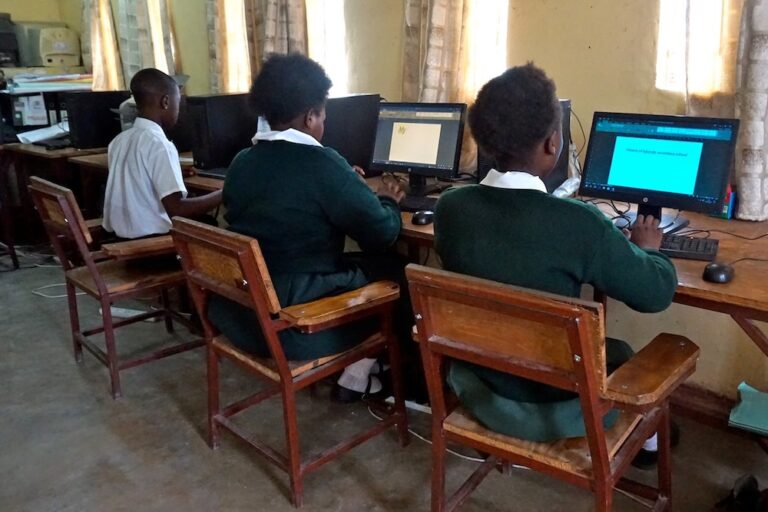November 2023 in Africa: A free expression round-up produced by IFEX’s Regional Editor Reyhana Masters, based on IFEX member reports and news from the region.
November, a month reserved for the commemoration of the International Day to End Impunity for Crimes Against Journalists (IDEI), was a month of tragic setbacks that ended on a high note.
A German court’s historic decision to convict Bai Lowe for his role in the murder of Gambian journalist Deyda Hydara, which took place almost two decades ago, is a reminder that the arc of justice can be long. Lowe, a former member of the Junglers – the infamous hit-squad that killed and tortured people under ex-dictator Yahya Jammeh – was sentenced to life imprisonment by a regional high court in Celle, Germany.
Arrested in 2021, Lowe was tried in Germany because, as Human Rights Watch explains: “the country’s laws recognise universal jurisdiction over certain serious crimes under international law, allowing for the investigation and prosecution of these crimes no matter where they were committed, and regardless of the nationality of the suspects or victims.”
Jammeh’s tyrannical rule of The Gambia for more than two decades was marked by gross human rights and freedom of expression violations ranging from threats, arbitrary arrests and detentions, torture and enforced disappearances, to extrajudicial killings. During the Truth, Reconciliation and Reparations Commission hearings, it was revealed that “over the 22 years, there were 140 incidents of arrests and 15 arbitrary closures of media” leading to a large number of journalists forced into exile. Many of these violations have been systematically documented by the Media Foundation for West Africa.
During this dark period, two critical questions – who killed Deyda Hydara, and where is Ebrima Manneh? – drove the advocacy strategy of the Gambia Press Union and the Media Foundation for West Africa (MFWA). Their work culminated in landmark rulings in the cases of Manneh, Hydara and Musa Saidykhan by the Community Court of Justice (CCJ), housed within the regional the Economic Community of West African States (ECOWAS) body.
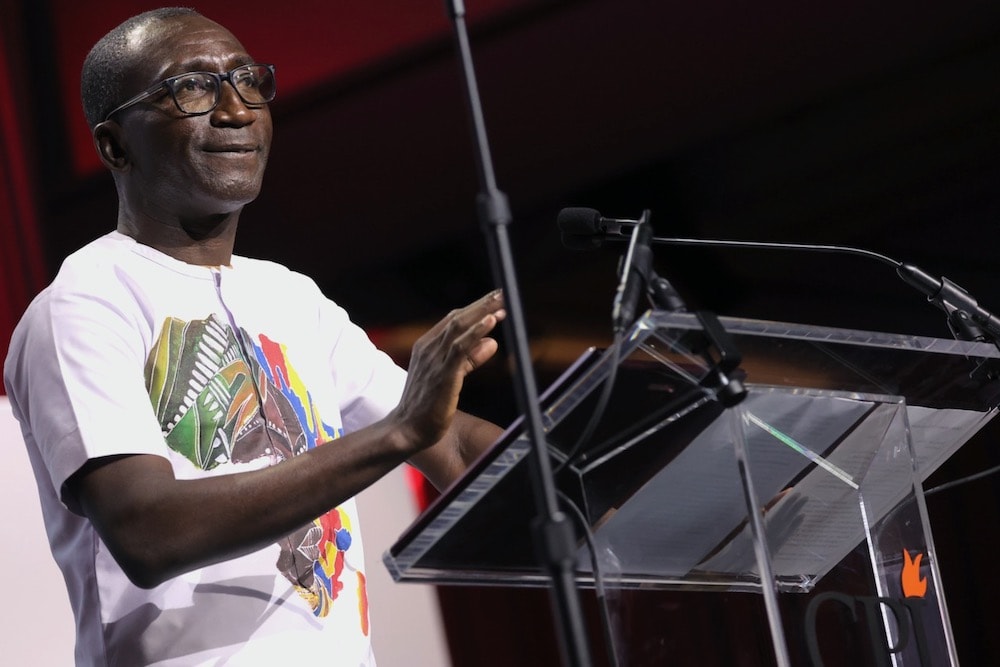
Togolese journalist and International Press Freedom Awardee Ferdinand Ayité speaks during the CPJ Press Freedom Awards ceremony, in New York City, USA, 16 November 2023. Michael Loccisano/Getty Images
Heavy penalty for reporting on corruption
Long-persecuted Togolese journalist Ferdinand Ayité was fittingly presented with the Committee to Protect Journalists’ (CPJ) 2023 International Press Freedom Award by Nigerian-American author Uzodinma Iweala at a ceremony in New York earlier this month.
Ayité and the publication he is a director of – L’ Alternative – have been in the Togolese government’s firing line for decades. Ayité’s partiality for critical investigative reporting and L’ Alternative’s trademark reputation for incisive coverage of corruption has drawn administrative sanctions, judicial proceedings and surveillance. Over the years, Ayité has had to deal with threats, intimidation and a legal onslaught in the form of arbitrary arrests, detentions, trumped up charges and imprisonment. His phone number has also appeared on the list of potential spyware surveillance targets in the Pegasus Project leak.
Earlier this month, Ayité and fellow journalist Isidore Kouwonou were convicted and sentenced to three years in prison and a fine of 3 million CFA francs (about USD5,000). They had international warrants issued against them after they were sentenced in absentia “on charges of ‘contempt of authority’ and ‘spreading mendacious comments on social media’”.
As Sadibou Marong, the director of Reporters Without Borders’ sub-Saharan Africa bureau, explained: “Ferdinand Ayité and Isidore Kouwonou were forced to flee their country for safety reasons, after repeatedly being arrested, intimidated and spied on by the authorities, and now they have been given prison sentences.”
The charges date back to 2021 when Ayité and the late Joel Egah, editor of the Lomé-based newspaper Fraternité, were jailed on charges of ‘insulting authority’ and ‘defamation’. They had discussed corruption allegations involving two ministers “on L’Autre Journal, a current affairs programme broadcast on L’Alternative’s YouTube channel […] The programme’s presenter, Isidore Kouwonou, was also questioned but was just placed under judicial control.”
Deadly risks for journalists in the Sahel region
Ayité’s tribute to African journalists in the Sahel region is a recognition of the threats the media contend with. The 7 November attack on four journalists travelling to a workshop from Ansongo to the city of Gao by unidentified gunmen in northern Mali is indicative of that risk.
MFWA reports that the “violent ambush led to the death of Abdoul Aziz Djibrilla from Radio Naata, while Harouna Attini, host of Radio Alafia sustained injuries and fellow colleagues Saleck Ag Jiddou, the director of Radio Coton, and radio host Moustaph Koné, were taken hostage.”
A report by RSF provides empirical evidence of these perilous conditions, pointing out that: “to be a journalist in the Sahel means enduring the growing presence of radical armed groups who do not hesitate to kill reporters or kidnap them and use them as bargaining chips. It means knowing how to cope with new military governments which, after taking power in coups, impose their own concept of journalism and issue “patriotic directives”.
Militarisation of information in Burkina Faso
A new law passed in Burkina Faso transforms the country’s media regulator – the Superior Council for Communication (CSC) – in a form and manner that has a far-reaching and adverse impact on the media.
“Passed unanimously by the Transitional Legislative Assembly on 21 November, the law reorganises the way the CSC functions and marks another step towards the “patriotic” news coverage sought by Captain Ibrahim Traoré, the president of Burkina Faso’s military junta.”
In addition to granting the head of state the power to appoint the head of the CSC, it also allows the regulator to monitor social media accounts and, as MFWA reports: “the authority to seize equipment and close down media houses, while Article (63), allows the regulator to order suspension of broadcast activities, and to temporarily or permanently withdraw press cards.”
The democratic decline in the country is being reinforced by additional actions by the junta, which is forcefully conscripting journalists and critics into the army. According to monitoring by the MFWA, Issaka Lingani (who is regularly featured on BF1 TV’s political programme, “Presse Echos”) and Yacouba Ladji Bama (an investigative reporter and founding editor of the online news website Bam Yinga) were summoned to a military base to be trained and deployed for the counter-terrorism operations against Jihadist rebels. Bama and Yinga responded by joining forces with a blogger and an activist – Rasmané Zinaba and Bassirou Badjo – to file an urgent petition contesting the conscription. The administrative court of Ouagadougou rejected the petition.
International Day to End Impunity messages zone in on demands for safety and justice
- A consistent theme running through the IDEI messages from IFEX members this year focused on bringing about accountability for crimes committed against journalists, and renewed pleas for a safer environment.
- Media Rights Agenda (MRA) expressed concern that: “ … in spite of numerous and frequently recurring cases of attacks against journalists in Nigeria, with at least 19 journalists killed over the years, no one has ever been charged with any crime for such attacks or punished for such offenses, …”
- The International Press Centre (IPC), Lagos-Nigeria bolstered MRA’s request, asking for “urgent but thorough investigations into the documented cases of crimes against journalists so that perpetrators can be held accountable.”
- The Gambia Press Union (GPU) emphasised how the “failure to bring perpetrators of crimes against Gambian journalists to justice, has helped sustained a cycle of violence against journalists for 29 years.”
- The Media Institute of Southern Africa (MISA) recalled the killing of Joki in Lesotho, and pointed out that while several people have been arrested for the crime, ” …. some journalists continued to receive threats online that they would meet the same fate” as the murdered journalist.
- The Association for Media Development In South Sudan (AMDISS) reiterated its “call to the transitional government of national unity to launch investigations into the killing of journalists in the country since the outbreak of civil war in 2013.”
- The MFWA urged the media to shed its inertia with regard to the issue of the safety of journalists, which has manifested in their failure to follow-up on violations to ensure the prosecution of perpetrators of attacks on journalists.
- The Human Rights Journalists Network of Uganda underscored: “the indispensable role of public leadership in safeguarding press freedom and the protection of journalists. Public leaders hold a responsibility to foster an environment in which journalists can operate without fear, coercion, or violence.”
In brief
The arrest of Walfadjri press group’s journalist Pape Sané on charges of false news is another example of Senegal’s crackdown on critical journalism. The arrest relates to Sané’s Facebook page, where he discussed the replacement of the high commander of the gendarmerie. If convicted of disseminating false news, Sané could face up to three years in prison and a fine under Senegal’s penal code.
In Togo, reporting on the theft of 400 million FCFA (a little over USD600,000) from the housing minister’s earned journalists Loic Lawson and Anani Sossou an unwarranted stint in prison.
Alagie Bora Sisawo, a culture and society talk show co-host on Kerr Fatou, was awarded D500,000 (USD8,168) in damages, after Gambia’s high court ruled that his rights had been violated by the police. “The court found that Sissawo’s detention by the police from 4 October to 10 October was unlawful and a breach of his fundamental right.”
Ghanaian journalist Nichola Morkah was assaulted and arrested by soldiers for recording the impounding of an illegal vehicle operation, during which police clashed with members of the public. “The MFWA is demanding that the police investigate the matter and bring the perpetrators to book.”
